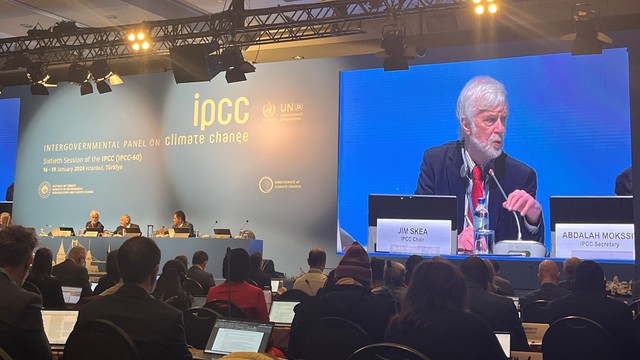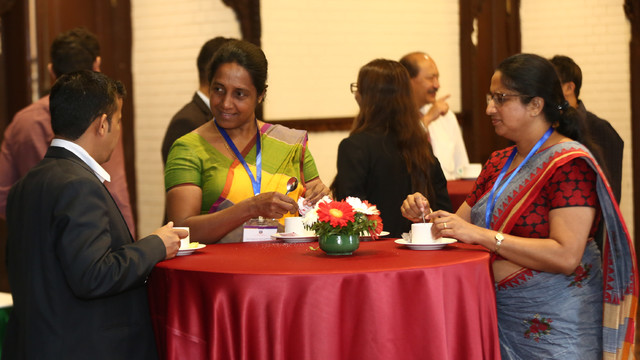Interview: What if our best world is still in front of us?
IIED trustee Alicia Pérez-Porro talks to Mary Robinson about climate justice and the urgent action IIED and all of us must take in response to climate change.

 Alicia Pérez-Porro (APP) became an IIED trustee in 2021. She is a marine biologist and scientific coordinator of CREAF, a Spanish ecology research centre focused on global change and biodiversity.
Alicia Pérez-Porro (APP) became an IIED trustee in 2021. She is a marine biologist and scientific coordinator of CREAF, a Spanish ecology research centre focused on global change and biodiversity.
Mary Robinson (MR) is a former chair of IIED's trustees. She was also the first woman President of Ireland, a former UN High Commissioner for Human Rights and is chair of The Elders – a group set up by Nelson Mandela.
As IIED marks its 50th year, they look back on past ambitions, discuss the current challenges IIED and others face, and think about the institute’s role in the future.
APP: I joined IIED as a trustee in December 2021 and when I was told of this chance to talk to you I immediately thought I’d like to know what your ambitions for IIED were when you were chair of the board of trustees?
MR: Well, I remember that I was honoured to be invited to chair. I knew the work of IIED and it intrigued me because it was work, very locally based, with pastoralists, with Indigenous Peoples, with small farmers. But it wasn’t using the human rights language that I was using, working in African countries in a somewhat similar way.
So I suppose part of my thought process was: how much can I learn from IIED and the good work they are doing, and how much can I persuade them that using human rights language helps because it gives people power?
APP: That’s very interesting because when I joined IIED the thing that really interested me too was exactly what you’ve said – the whole human rights perspective, and how it has to be embedded in everything IIED works on.
I read the transcript of the Barbara Ward Lecture you gave in 2006, and one of the things that surprised me was how relevant everything you said was for today, despite the fact that the talk was so long ago.
MR: Ah, Barbara Ward, she was such a brilliant writer and speaker! I remember, you know, thinking of two different concepts at the time: climate change and justice. And it’s interesting that’s the title. It wasn’t climate justice, it was climate change and justice. And I was just beginning to bring those two things together.
Even then I was so struck when I realised that climate change was impacting much earlier and much more seriously the poorest countries, the poorest communities, the small island states, the Indigenous Peoples. And they weren’t responsible and they also happen to be many of the Black and brown people of our world. And so there was a sense of racial injustice. And then the gender injustice within that.
Since then I’ve gone on and thought about intergenerational injustice. Young people have been calling us out on it, and rightly. They’re angry because they can’t make the changes needed and they’re seeing we’re not doing that enough – or urgently enough.
And then, you know, there’s also an injustice in the pathways to development where industrialised countries built our economies on fossil fuel. And developing countries need to develop and they want to go green as quickly as possible but it takes upfront investment, skills, training, technology. Maybe even sharing of intellectual property. And we really haven’t done anything like enough in that direction.
And then the final injustice, of course, is to nature herself. So I was feeling all of that in 2006. I now talk much more confidently about it because I’ve thought about it for much longer.
APP: You talked about intergenerational injustice and it’s interesting because recently 14 people were arrested here in Spain because of a protest in front of congress about the government’s climate inaction in the last years. In the US, scientists are also being arrested.
Do you think that that’s the future we have? Scientists being arrested around the world until someone really listens and starts taking action?
MR: I must say I have a lot of sympathy and empathy with those who are protesting because they understand the science and they’re very worried and upset and angry that we’re not taking the steps we should be taking. I don’t think we should be arresting them. We should be listening to them and following the science.
APP: So what can we do as IIED trustees to accelerate things?
MR: Well I think IIED has a very good voice to increase the urgency of acting. IIED, I think, has to join other organisations and bodies in a broad movement that asks us all to adopt what I call a ‘moonshot’ mentality. You remember when John F Kennedy said that the United States would put a man on the moon? He was worried because the Russians already had a Sputnik up there and it was impossible when he said it. And it happened in eight years. And, the average age in NASA at the time was 26 – it’s young people who made that happen.
Well, we are about seven-and-a-half years now to 2030. We need that kind of mentality to do far, far more in the polluting parts of the world, the heavy emitters, the G20 countries in particular, but all of the countries that are industrialised, to get out of fossil fuel. I’m looking to women leaders, young people, to faith leaders. But I’m also looking to organisations like IIED that have a long record of working in research to show what needs to be done.

Mary Robinson and Maarten van Aalst, head of the Red Cross Red Crescent Climate Centre and IIED trustee, at D&C Days (Photo: Climate Centre via Flickr, CC BY-NC 2.0)
APP: It’s so interesting – I think that this just happened with the vaccine for COVID-19? We were able to produce a vaccine in such a short amount of time and it’s because of this mentality that you were talking about. We were focused, we decided that we needed this and we did it. So, how do we persuade people to have this mindset?
MR: I think we need to have a more positive framing. I learned a very good lesson just in April from an Indigenous woman leader from New Mexico in the United States. She was part of a group of women leaders where we were discussing these issues, and she told me a saying: ‘What if our best world is still in front of us?’ And it is.
Our best is in front of us. It’s a world free of fossil fuel. It’ll be much healthier and more equal. The 600 million in Africa who never switch the switch for electricity will have clean energy in their home. The 900 million who cook in Africa on dirty cooking alternatives like charcoal, wood, animal dung – they will have clean energy. We’ll have cities with not just gardens but vertical farms. We’ll have re-wilding of the countryside and projects to renew biodiversity.
But of course we also face a worst world and we talk too much about that worst world in fear terms. I don’t think people are driven by fear. They’re driven by hope and the energy that comes from that.
APP: Absolutely. "What if our best world is still in front of us?" – what a beautiful sentence. I’m going to remember that.
So, if you were going to deliver the Barbara Ward Lecture now, what would you focus on, and why?
MR: I would focus on this need for urgency. Because we’ve had the Paris climate agreement, we know that the goal is the whole world must stay at 1.5°C. We know we have to reduce global carbon emissions by 45% by 2030. And align to net zero by 2050. All of that is clearer now. But I would be doing it in a hopeful context.
And I’m very keen on the intergenerational conversation – but it must be a two-way dialogue. Now young people are aware, they’re digitally smart, connected and they have ideas about the future they want. They also have a sense of justice, a sense of those who are suffering.
We need to make sure those who have responsibility are held to account: the big emitters, the G20 countries. I called out Australia at COP26: under a new government it is already making commitments and moving in the right direction.
APP: And what can we all do to help this?
MR: What we need now is for communities to take on a leadership role. Whether it’s in developing countries where IIED does most of its work, or in the developed world. I’m very glad that County Mayo, where I come from, is taking on climate as a county. That’s what we need everywhere.
We need everyone to take more personal ownership and change their lifestyle where they can. And then we must get angry about those who aren’t doing enough at all levels – governments, even cities – certainly the fossil fuel industry, industry generally, investment, all need to do more.
And finally, and this is the most important, keep thinking about that best world. Keep imagining that future we need to be hurrying towards.
APP: Thank you very much – that was amazing. Thank you from the bottom of my heart.



